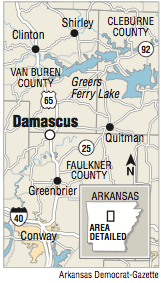CONWAY -- A prosecutor said Wednesday that he would not lift speed-trap sanctions against the small town of Damascus, in part because of what he called the level of past abuse of police power.
Barring court action, the decision by Prosecuting Attorney Luke Ferguson means the sanctions will remain in effect through the end of 2018 for the town, which lies along U.S. 65 between Conway and Branson.
The sanctions prohibit Damascus police from patrolling U.S. 65 or Arkansas 124, both of which run through the town of about 380 residents. The Arkansas State Police and sheriff's offices in Faulkner and Van Buren counties now handle traffic patrols there.
Damascus City Attorney Beau Wilcox had recently asked Ferguson to lift the sanctions and had said the city would agree to some restrictions.
In a letter to Wilcox, Ferguson said he based his decision on two factors.
"First, the extent of the abuse of police power discourages me from removing the sanctions," the prosecutor wrote.
"Second, the city's proven lack of oversight, which allowed the ... problems to develop, is a significant factor in my decision to leave the sanctions in place," he added.
In an emailed statement, Wilcox said that "the practical effect of these sanctions has been not to curb alleged police abuse," but essentially to "advertise to motorists that Damascus police will be powerless to stop and cite those who legitimately violate traffic laws within the community, thereby encouraging more flagrant violations."
[DOCUMENT: Read the prosecuting attorney’s letter]
Then-Prosecuting Attorney Cody Hiland found last year that the town was operating an illegal speed trap and ordered the sanctions. Ferguson, who succeed Hiland in office, reviewed and stood by the sanctions.
"With a population of only 382, Damascus employed up to eight full-time and part-time police officers," Ferguson wrote in the letter to Wilcox. "To compare two other small cities also located on Highway 65 in the [20th] Judicial District, Clinton has a population of 2,602 and employs seven full-time and two part-time officers, and Marshall has a population of 1,355 and employs three full-time officers and one part-time officer.
"The police force in Damascus and their policing activity were extremely disproportionate to the reasonable public safety needs of the city," Ferguson wrote.
Ferguson also said the Damascus mayor and the City Council had shown an inability to supervise the former police chief, who was fired last year and not replaced.
"Because the city's proposal [to lift sanctions] relies on the mayor's ability to manage the affairs of the police, my concerns remain that the abuse of police power will continue without a chief and even with a reduced number of officers," Ferguson added.
Since the sanctions took effect in May 2017, the city has downsized its police force from four full-time and two part-time police officers to one part-time officer. As recently as five years ago, the city employed as many as seven or eight full- and part-time officers.
Wilcox said the issue should be about traffic volume and public safety, not population.
"The city and its police department are not perfect but have been committed to keeping Highway 65 and all other city streets safe for many years," he added. "These ongoing sanctions have hamstrung those efforts greatly and stigmatized the city unfairly."
State Desk on 05/17/2018
